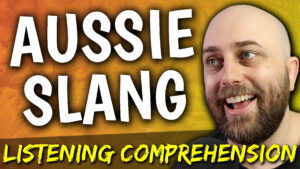
AE 1123 - INTERVIEW
Ivermectin & Hydroxychloroquine & the Ethics of Leaders & Influencers with Big Audiences | with Dr Dan Wilson
Learn Australian English in each of these episodes of the Aussie English Podcast.
In these Aussie English Interview episodes, I get to chin-wag with different people in and out of Australia!

In today's episode...
Welcome to this episode of the Aussie English podcast!
We got another man of science in the podcast today!
This guy like me is another science lover – he got his bachelor’s degree in Biotechnology and Molecular Biology from Clarion University and his PhD in Molecular Biology from Carnegie Mellon University.
Meet Dr. Dan Wilson, creator of the YouTube channel Debunk the Funk with Dr. Wilson!
In his channel, he debunks the claims of anti vaxxers, the covid deniers, and various misinformation that’s circling the Internet.
This is part three of a four part series, so if you missed the first two episodes, go back and listen to those first!
Today we talk about the controversial drugs, ivermectin and hydroxychloroquine, and what the science says about whether or not they are effective in the treatment of COVID 19.
We talk about the ethical and moral responsibility of celebrities, with huge audiences hosting controversial figures on their platform who’ve been shown to spread misinformation about COVID in the past.
We also talk about the recent episode with Robert Malone on the Joe Rogan Experience podcast – they talked about so much misinformation about Covid and Covid vaccines that music artists on Spotify protested against their controversial episode!
We talk about Pierre Kory and Peter McCullough turning up on the Dark Horse podcast with Bret Weinstein as well.
We talk about if there’s ever a limit of freedom of speech, particularly when facing something like a pandemic.
Could it be that politicians and other political figures and public figures are intentionally lying to the public in order to try and achieve a good outcome? — Remember when Dr Anthony Fauci of the US claimed that masks didn’t work early in the pandemic so that he could save masks and other PPE for medical workers.
See you in the next episode!
** Want to wear the kookaburra shirt? **
Get yours here at https://aussieenglish.com.au/shirt
Improve your listening skills today – listen, play, & pause this episode – and start speaking like a native English speaker!

Watch & listen to the convo!
Listen to today's episode!
This is the FREE podcast player. You can fast-forward and rewind easily as well as slow down or speed up the audio to suit your level.
If you’d like to use the Premium Podcast Player as well as get the downloadable transcripts, audio files, and videos for episodes, you can get instant access by joining the Premium Podcast membership here.
Get more out of every episode!

Premium Podcast members get access to...
- All 900+ podcast episodes including member-only episodes
- Member-only episode video lessons
- Downloadable transcript PDFs & audio files for every episode

Recent Episodes:


AE 1361 – The Goss: TV Shows We’re Currently Binge Watching [Members Only]

AE 1360 – 20 English Idioms Explained | Members Only

AE 1359 – 20 English Idioms To Transcribe

AE 1358 – How to Pronounce -ED Endings in Australian English [Members Only]

AE 1357 – How to Pronounce -ED Endings in Australian English

AE 1356 – Will AI Save Us Or Replace Us?

AE 1355 – 20 Aussie Slang Sentences Explained [Members Only]

AE 1354 – 20 Aussie Slang Sentences to Transcribe

Share

Join my 5-Day FREE English Course!
Complete this 5-day course and learn how to study effectively with podcasts in order to level up your English quickly whilst having fun!


Want to improve a specific area of your English quickly and enjoyably?
Check out my series of Aussie English Courses.
English pronunciation, use of phrasal verbs, spoken English, and listening skills!

Have you got the Aussie English app?
Listen to all your favourite episodes of the Aussie English Podcast on the official AE app.
Download it for FREE below!



Want to improve a specific area of your English quickly and enjoyably?
Check out my series of Aussie English Courses.
English pronunciation, use of phrasal verbs, spoken English, and listening skills!
Leave a comment below & practice your English!






Responses